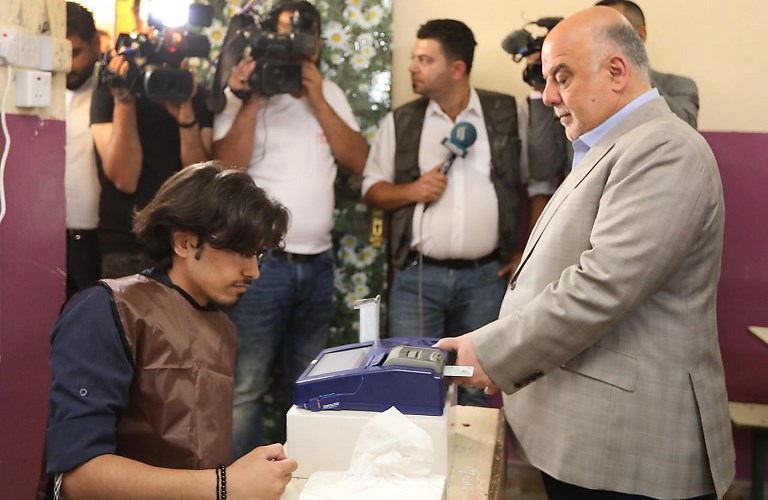
by Sarah Benhaida
© Agence France-Presse
BAGHDAD, Iraq (AFP) — Iraqi Prime Minister’s political grouping appeared in the lead Sunday following the country’s first election since defeating the Islamic State group, after a vote hit by record abstentions.
Preliminary results given to AFP by several senior political figures showed Abadi’s Victory Alliance scooping some 60 of the 329 parliament seats up for grabs.
The result from Saturday’s nationwide poll would make Abadi frontrunner in the horse-trading that will decide who becomes premier for a new four-year term.
But there is likely to be lengthy haggling over the makeup of a future coalition government.
Abadi — who came to power as IS swept across Iraq in 2014 — is a consensus figure who has balanced off the United States and Iran.
The preliminary results put the anti-establishment alliance of Shiite cleric Moqtada Sadr and Iraq’s communists, who have protested against corruption, on second place with 51 seats.
Third position was taken by the Conquest Alliance, made up of former fighters of mainly Iran-backed paramilitary units that played a key role in fighting IS.
Led by former commander Hadi al-Ameri, the group has won around 30 seats, the officials said.
US-Iran tensions
The vote came with tensions surging between the United States and Iran after Washington’s withdrawal from the 2015 nuclear deal, sparking fears of a destabilising power struggle over Iraq.
US Secretary of State Mike Pompeo, whose country still has troops in Iraq from the fight with IS, lauded the poll and called for an “inclusive government, responsive to the needs of all Iraqis”.
Whoever emerges as premier will face the mammoth task of rebuilding a country left shattered by the battle against IS — with donors already pledging $30 billion (25 billion euros).
But the election on Saturday saw a record low turnout for Iraqi elections since the 2003 US-led ouster of Saddam Hussein, as just 44.5 percent of eligible voters cast their ballots.
Many across the war-scarred nation are fed up with the political elite seen as mired in corruption and sectarianism that has dominated Iraq since the US-led invasion.
Turnout was low despite a sharp decrease in violence across the country, with threats from IS against the polls failing to materialise.
Iraqis were faced with a fragmented political landscape, some five months after IS was ousted from the country.
Voting was stronger in some areas freed from the jihadist yoke, with people queueing up to cast their ballot in the battered former IS bastion of Mosul.
Results in the Sunni heartlands once dominated by the jihadists were set to change radically with Shiite-led groupings pushing to make inroads.
Participation was also higher than elsewhere in Kurdish regions, where the traditional political forces have been left in disarray by a disastrous push for independence last year.
Baghdad seized back disputed oil-rich regions in the wake of a controversial referendum, threatening the role of kingmakers typically played by the Kurds on the national stage.
The US-led coalition that helped battle IS pledged to work with the elected government to ensure the jihadists’ “lasting defeat” and said Saturday’s poll proved Iraqis “emphatically rejected violent extremism”.
© Agence France-Presse








